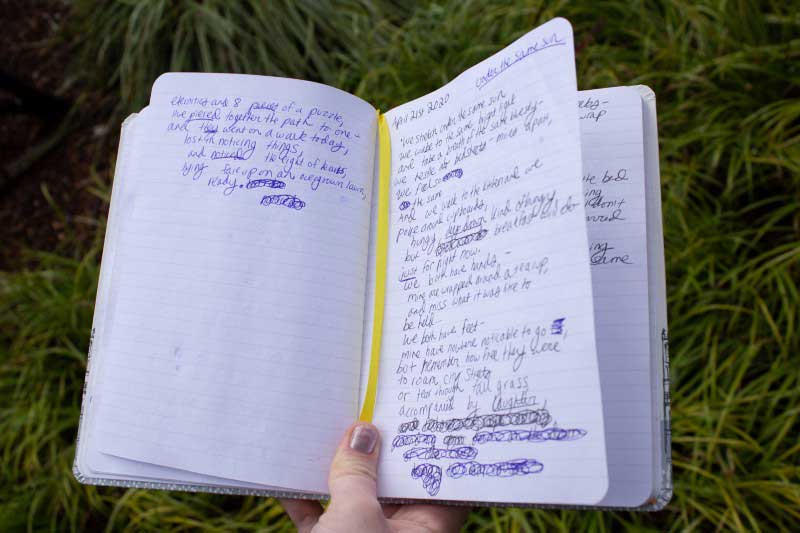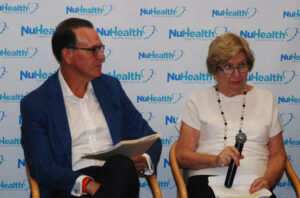By Sabrina Lee
Editor’s note: This story first appeared in PULSE, which is published by the Lawrence Herbert School of Communication’s Magazine Production class for Hofstra University students and residents of surrounding communities.
Like many of us, 19-year-old Tori Bogacki suddenly found herself alone — with only her thoughts — in March of 2020. She had just been told to leave her university campus indefinitely, and the news cycle turned into an endless spiral of Covid-19 press briefings, grieving and fear. Suddenly, she was alone in New York while her friends were states away, and she thought about the normal life she had taken for granted. In searching for comfort and consolation, she put pen to paper.
“I never knew the artistry of standing in a crowd until I stood alone. Or understood the blessing that it is to walk through a park on an April day surrounded by life,” writes Bogacki in her poem, “Under the Same Sun.”
Bogacki has long gravitated towards creating art. She is a Bachelor of Fine Arts drama major, with minors in French and musical theater at Hofstra University, and had for many years pursued writing as a hobby until the pandemic hit.
Sometime between June and July of 2020, as the coronavirus pandemic raged across the country, she decided to compile the poems she had written throughout the years and started working on publishing her very own poetry book, “Moon Face Child.” Her book is expected to be published this May through Amazon’s self-publishing program. The book features more than 55 poems divided into different collections — from the pandemic and childhood to themes of grief and loss.
“I found myself in a space because I am a drama major, where there’s a lot of things artistically that I love to do that with Covid has been difficult,” Bogacki said. “I was like, ‘How can I create a product or create something that gives beauty back into the world? How can I make something artistic that is meaningful and that is feasible within the realm of Covid-19?’”
Diving deeper into free verse poetry was just the answer. She began writing a poem every day or every few days, and then realized she also wanted to publish.
The decision was no surprise to her mom, Victoria Bogacki. In her eyes, pursuing a poetry book was a natural progression of her daughter’s love for writing.
“She always had an affinity and just connected to” writing, her mom said. “I remember, she was little, and it started right when she was in school. It was so natural with her.”

For Bogacki, writing poetry also allowed her to be more open and vulnerable as an artist. In her writing, she is not portraying a character as she would in a film, but instead, choosing to tell her own stories.
A notable story she decided to tell was one describing her relationship with her mom. It’s a tale of her growing up in the countryside warmed by the love of her mother, who used to call her moon face child — the title of Bogacki’s book.
“Moon face child, come dance with me. My mother held my face within the palms of her hands like sturdy oak trees that fill with water when she heard music. And gently she would sing to me like a siren lulling me to gentle sleep,” writes Bogacki in her poem.
After coming out of some difficult situations and a tumultuous relationship, Bogacki was doubting herself and her worth. Then, something reminded her of the term of endearment her mother used to call her by.
“I remember very vividly as a kid walking around the property at night or sitting by the window having this moonlight on my face and my mom would always kind of joke, ‘Oh, moon face.’ She would call me that as a kid, and I kind of explored that idea of what if, to some person — my mom, in this case — I was the moon,” she said.
For her mom, the poem makes her emotional and nostalgic about the memories she shares with her daughter. “Gosh, I didn’t expect to get tears in my eyes,” her mom said.
“To me, she was this beautiful little girl. At night, I was holding her in bed, and you know how the moonlight will come in if you have the curtains open,” her mom said. “The moonlight was shining on her face, and she was always had her round, pretty little face, and I started to call her my moon face child.”
The poems come from a place of honesty. Bogacki is highly specific as she paints these scenes from her life, but they still evoke feelings relatable to any person.

Bogacki strategically chose poems that fit her vision for what she wanted this book to be for other people. This meant leaving certain poems out — even if they meant the world to her.
“I think a lot of them have themes that hopefully speak to a lot of people and kind of uplift and inspire and cause reflection in a lot of people. I think I touch on things that are pretty universal to some extent,” she said.
John Baynes, her former high school English teacher, agreed with her sentiment and said he could not wait to read his former student’s book.
“Tori’s poetry is informed by her elite experience as an actress, singer and filmmaker. She understands the power of voice, the clear voice of a human in the full sense of her humanity,” Baynes said. “To read Tori’s poetry is to invite the human condition into your imagination and to converse at the most intimate and authentic level.”
With her cover currently in the works, Bogacki is well on her way and hopes to publish her book this May.
Even in the midst of a global pandemic, Bogacki found a way to remain hopeful and pursued a passion project that — if not for the time and space created by Covid-19 — might have never happened.









